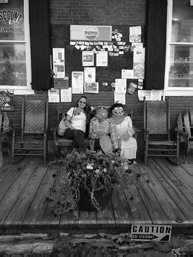The upstairs of a fraternity house the morning after tells the tales of bad decisions, one too many drinks, and, hopefully, stories we’d be ashamed to tell our kids. Guests tip over trash cans on their way out. Brothers turn over sofas scrambling to find what seems to be the last pong ball in Hanover. Alcohol tells you the door won’t open, so your foot has to figure it out. Nobody ever knows who destroyed the bathroom the night before. It’s a Tuesday. Or a Thursday. If it’s a big weekend, it’s every morning. A by-product of the Greek System’s open-door policy is scenes like these.
Starting at 8 AM, until around 3 PM, Sue and Dave Cooper’s cleaning crew makes its rounds Monday through Friday, hitting two houses per day. “We are proud to say we now clean … Phi Delt, Theta Delta Chi, Psi-U, Zete, Bones Gate … and SAE.” Sue boasts.
Sue is fifty-four and has four children with her husband, Dave. She has been happily married for seventeen years, and they have twelve grandchildren between them. “Dave and I had very demanding and stressful jobs,” Sue began. Sue worked at FujiFilm and Dave worked at Hypotherm, a corporation specializing in software for manufacturing cutting systems to make plasma cutters, fiber lasers, and water jet cutting systems to be used in shipbuilding, manufacturing, and auto repair. Wanting a more relaxed work environment, they set up their own small business in 2008, working as independent contractors for Dartmouth fraternities.
The hackneyed media-driven perception of fraternities that hinges on hazing, sexual assault, and high-risk drinking has been adopted by many inside and outside the Dartmouth community. Coming into Dartmouth, freshman are bombarded with horror stories from all angles. You can read about it in the Huffington Post, or you could even, if you really wanted, pick up a Dis-Orientation Guide from Novack.
Based on the seven hours the Coopers spend daily in frat houses and around brothers, they see “well-dressed, well-mannered academic minded kids who set good examples for the surrounding communities.” The Coopers are among the few people who interact with fraternities on a daily basis, and at a personal level. They have seen the various permutations of people that the Greek system fosters, and they have been doing do for six years, well before Dartmouth went on a campaign to clean up the fraternity system. Sue feels that “some of [the brothers] look towards me as a house mother, not a cleaner, and feel a strong bond of trust between us … When anyone asks how many children I have my reply is, ‘One daughter and hundreds of sons!’” Like a family for these fraternities, the Coopers even make home-cooked meals to share with the brothers, eating together either at the fraternity houses or their personal home. While some professors and administrative bureaucrats would never bother to accept an invitation to a fraternity house, the Coopers go as far as to break bread with the often-polarizing fraternity houses. They certainly have a better understanding of each the individual brotherhoods they clean for than the Administration does.
The Coopers also believe that “[t]he brothers of all these fraternities are elite, intuitive, caring young men who show us the utmost respect during the course of the day while we are in their private houses cleaning.” “Intuitive” and “caring” are not words often associated with fraternities, either by the media or our administration. After six years of consistent interaction with fraternities, that the Coopers can “go the extra mile and … cook them a home-cooked meal” attests to the humanizing effect that comes with making the effort to get to know the unique individuals that come through Dartmouth. “Elite” is often a buzzword for the Action Collective and the like, complimenting, as the Dis-Orientation Guide drones, “racism, homophobia, classism, sexism, xenophobia and other structural oppressions.”
The Coopers come away from their fraternity experiences with, as Sue says, “special bonds with certain students and we keep in touch after graduation and I follow along their new journey out into the world. I have said in the past, ‘Hey, I know that person,’ with pride as they advance into important jobs for their future.” By contrast, the administration’s main concerns are padding the endowment and saving face in the media. There is no room for tracking personal development with current students or alumni; relationships give way to statistics.
The Coopers are among the many local citizens Dartmouth students interact with. You get a quick conversation in with Souleymane as he rings up a meal at the Hop; Collis Dave makes you laugh as he makes your morning omelet; your dorm’s janitorial staff makes sure to tell you good morning on your way to class. The fraternities themselves have equally unique relationships with members of the surrounding community. Most of the philanthropic causes fraternities fundraise for are directly affecting the local community. Greek system volunteers feature prominently in the Prouty during sophomore summer by participating, organizing participants and setting up the tents and chairs to host the large number of people who go to support. Some fraternities coach Little League soccer and baseball teams, mentoring young kids in the Hanover community, some of whom are professors’ children. In addition to volunteering, fraternities emphasize the use of local handymen and other small businesses to do various jobs. Accordingly, the Coopers mention that, “The fraternities’ effects on the surrounding communities are important.”
In addition to consulting affiliated and non-affiliated students, professors, and administrative bureaucrats, the administration would do well to focus less on “cleaning up” the fraternity system, and instead, take some cues from those who actually do it. Regulating student behavior requires a direct knowledge of the students themselves, which the administration lacks the capacity and desire to accomplish. The Coopers, in only six years, have learned more about these fraternity members than any faculty advisor could claim to. If people took the right approach with regard to the fraternity system, they might very well find it to be “the most gratifying and relaxed job [they] have ever had.”
George W. Easley also contributed to this article.



Be the first to comment on "Cleaning House"